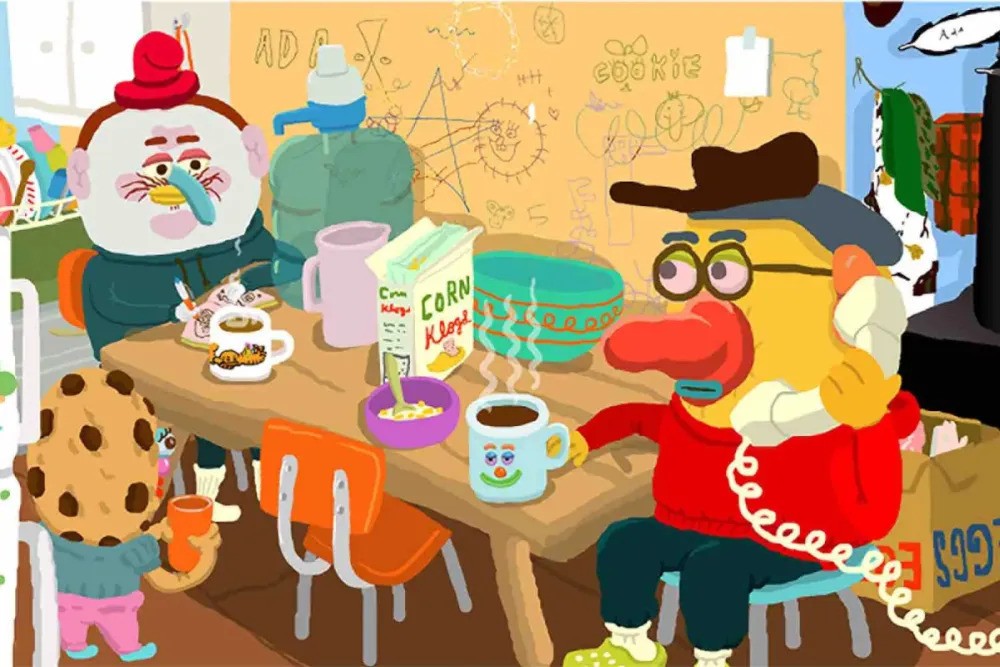Endless Cookie
Endless Cookie
VERDICT: A delightfully bizarre ruckus of wild family anecdote, the Scriver brothers’ animation is an astute catalogue of Canadian First Nations dispossession, and a hopeful contribution to resurgent knowledge.
The huge round heads with sausage-like noses fashioned in painterly blocks of bright colours with small hats atop them appeal to a rambunctious absurdism not often associated with records of painful history, but there is little that is by the book about Endless Cookie, a dynamic, imaginative dive by brothers Seth and Peter Scriver into their family’s past. Screened in the International Competition Animated Film at DOK Leipzig, the feature-length digital animation is so hectic and outlandish it would be easy to miss how artfully and astutely a catalogue of injustices and indignities that have oppressed Canada’s First Nations people under colonialism and derailed so many lives have been woven in, for a feature as politically devastating as it is delightfully bizarre, amusing and unabashed in its embrace of fart jokes and silliness.
Endless Cookie took nine years to complete, a process that becomes part of the family’s on-screen story, in a film that concludes that looking to the past is essential as a means to navigate and ease the future. It opens with Seth receiving a large cheque, his film proposal grant’s acceptance enabling him to fly from Toronto to visit his indigenous half-brother Pete in Shamatawwa, a remote First Nations community in northern Manitoba, to record seven stories about his life for the project’s audio. Seth’s inability to deliver the film on time amid deadline extensions from skeptical backers becomes a running gag. During a phone call to arrange the first of several Manitoba visits, Seth’s cat scratches up his sofa, while Pete’s dog eats his sock, as news is shared of the blaze that destroyed the tepee he wanted to sleep in, in a catastrophic melee of distractions that is typical of their family life and never abates. But finally and miraculously, he achieves his stated goal of making something “funny, beautiful, spiritual, complex, simple and true,” a disarming, tremendously wide-ranging sweep, and no mean feat.
Rather than seven clearly structured stories, what results is a hodge-podge of wild incident and digression, spanning a cast of colourful characters: extended family and acquaintances, an array of pet dogs and puppies, and the cowardly law enforcement figures which become an unavoidable part of institutionalised strongarm control over indigenous lives and resources, who are mentioned with the wry, understated resignation Pete brings to all his tales. Actual family photos are included, that anchor the drawn narratives in evidential reality, and tend to confirm some of the more outrageous yarns. From a hand stuck in an animal trap to a hard liquor phase in which Pete returned to an old apartment and dragged its current tenant out of bed, the memories recall both traditional Cree hunting life, and the disorientation of disenfranchised urbanisation. Ancestral knowledge, as a new generation rebuilds the tepee, and a caribou is cut up and its hide prepared, abounds, along with the transmission of new modes of processing identity (within the film, young Cookie Scriver is making her own unsettling animation, about sleep paralysis.) Enforced separation for a stolen generation of kids, suicide and substance abuse are among family experiences in a litany of trauma, as First Nations people were left restricted to tiny reserves, their hunting lands exploited in a rush for minerals, and the damming of rivers upending their fishing. Snippets of radio reports sound through the household hubbub, telling of the lack of clean drinking water on reserves throughout Canada, and indigenous over-representation in Canadian jails due to racism in policing and a corrupt justice system.
Endless Cookie crams a huge amount of suffering and oppression into its tapestry of family history — and its magic is that it conveys this macrocosmic tragedy of the colonial dispossession of a people with such a light touch of lunacy and joy in everyday strangeness this is no heavy chore for the audience. What’s more, its outlook is one of hope, through its very existence and the endless generation and circulation of memories, and the resurgence it promises of what for a time may have seemed lost, like the visions in cigarette smoke that the grandmother would look for, just as medicine men in shaking tents had seen where animals could be hunted, relaying the information to other tents, in the manner of the modern internet.
Directors, Screenwriters: Seth Scriver, Peter Scriver
Producers: Daniel Bekerman, Chris Yurkovich, Alex Ordanis, Jason Ryle, Seth Scriver
Editor: Sydney Cowper
Sound: Andrew Zuckerman
Production company: Scythia Films (Canada)
Sales: Magnify
Venue: DOK Leipzig (International Competition Animated Film)
In English
97 minutes


